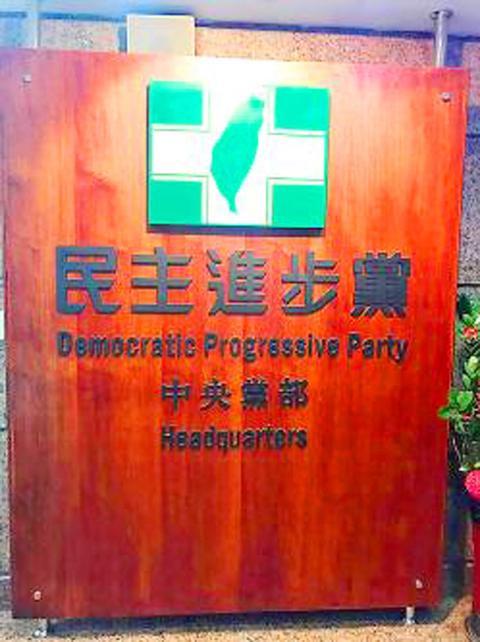The Democratic Progressive Party (DPP) yesterday reiterated its stance on protecting the nation’s democracy as it responded to the resignation of a campaign spokeswoman over a controversial remark about unification with China.
President Tsai Ing-wen’s (蔡英文) former re-election campaign spokeswoman, Lin Ching-yi (林靜儀), resigned on Friday after she came under fire for saying in an interview with German broadcaster Deutsche Welle on Thursday that, in terms of national sovereignty, proposing unification with a hostile power such as China constitutes “treason.”
The remarks were seen as highly controversial, coming just days after the DPP rammed an anti-infiltration law through the Legislature on Dec. 31 that criminalizes political activities backed by hostile foreign forces such as China.

Photo: Su Fun-her, Taipei Times
Lin said in the interview that China had threatened Taiwan with use of military force, and that legislation passed last year meant there would be consequences for retired military officers who participated in political events in China.
The protection of Taiwan’s democratic systems and its way of life, and the rejection of any scenario in which the Republic of China would cease to exist, such as China’s “one country, two systems” formula, were matters of consensus among the nation’s 23 million people, the DPP said yesterday.
The DPP has walked hand-in-hand with Taiwanese for 30 years, fighting for political transformation, freedom from the one-party, authoritarian regime of the Chinese Nationalist Party (KMT), and the establishment of a country free of fear, the DPP said.
Having become a mature democracy where freedom of speech is protected by law, Taiwan would not return to a period of “white terror,” it said.
The DPP’s passage last year of the Resolution on a Shared Journey With Society (社會同行世代共贏決議文) was in the spirit of the party’s 1999 Resolution on Taiwan’s Future (台灣前途決議文), and reiterated its stance on national reform and the nation’s self-determination, it said.
No party, including the DPP, could make decisions on behalf of the public, it said.
Separately, Tsai said on Facebook that democracy has always been the party’s core value, and that it had never viewed differing political views as treasonous.
“Let me clearly state that our nation’s name is the Republic of China, and the sovereignty of that nation is in the hands of its 23 million people. Therefore, there is no issue involving the renaming of the country,” Tsai said.
Her most important responsibility as president is the defense of the nation’s sovereignty, freedoms and democratic way of life, she said.
Additional reporting by CNA

Alain Robert, known as the "French Spider-Man," praised Alex Honnold as exceptionally well-prepared after the US climber completed a free solo ascent of Taipei 101 yesterday. Robert said Honnold's ascent of the 508m-tall skyscraper in just more than one-and-a-half hours without using safety ropes or equipment was a remarkable achievement. "This is my life," he said in an interview conducted in French, adding that he liked the feeling of being "on the edge of danger." The 63-year-old Frenchman climbed Taipei 101 using ropes in December 2004, taking about four hours to reach the top. On a one-to-10 scale of difficulty, Robert said Taipei 101

A preclearance service to facilitate entry for people traveling to select airports in Japan would be available from Thursday next week to Feb. 25 at Taiwan Taoyuan International Airport, Taoyuan International Airport Corp (TIAC) said on Tuesday. The service was first made available to Taiwanese travelers throughout the winter vacation of 2024 and during the Lunar New Year holiday. In addition to flights to the Japanese cities of Hakodate, Asahikawa, Akita, Sendai, Niigata, Okayama, Takamatsu, Kumamoto and Kagoshima, the service would be available to travelers to Kobe and Oita. The service can be accessed by passengers of 15 flight routes operated by

Taiwanese and US defense groups are collaborating to introduce deployable, semi-autonomous manufacturing systems for drones and components in a boost to the nation’s supply chain resilience. Taiwan’s G-Tech Optroelectronics Corp subsidiary GTOC and the US’ Aerkomm Inc on Friday announced an agreement with fellow US-based Firestorm Lab to adopt the latter’s xCell, a technology featuring 3D printers fitted in 6.1m container units. The systems enable aerial platforms and parts to be produced in high volumes from dispersed nodes capable of rapid redeployment, to minimize the risk of enemy strikes and to meet field requirements, they said. Firestorm chief technology officer Ian Muceus said

MORE FALL: An investigation into one of Xi’s key cronies, part of a broader ‘anti-corruption’ drive, indicates that he might have a deep distrust in the military, an expert said China’s latest military purge underscores systemic risks in its shift from collective leadership to sole rule under Chinese President Xi Jinping (習近平), and could disrupt its chain of command and military capabilities, a national security official said yesterday. If decisionmaking within the Chinese Communist Party has become “irrational” under one-man rule, the Taiwan Strait and the regional situation must be approached with extreme caution, given unforeseen risks, they added. The anonymous official made the remarks as China’s Central Military Commission Vice Chairman Zhang Youxia (張又俠) and Joint Staff Department Chief of Staff Liu Zhenli (劉振立) were reportedly being investigated for suspected “serious